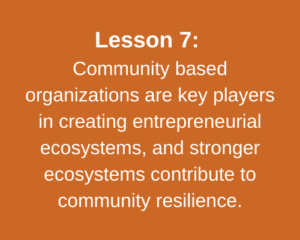Lessons Learned from Ecosystem Building in Oregon: Lesson 7

“We didn’t know it, but we were prepped and ready to help when funding became available during the pandemic to help our business community.”
– Brenda Smith, Executive Director, High Desert Partnership
Local “hub” organizations such as community-based organizations and local government agencies, including non-profits, business incubators, Main Street organizations, City governments and the like, play a critical role in high-functioning, effective entrepreneurial ecosystems. These organizations can build trusted relationships with businesses, communicate assistance opportunities, and act as connectors to resources.
The BizHarney Opportunity Collaborative is an example of how this can work. This collaborative, made up of government and nonprofit entities along with Tribal economic development, came together in 2017 to find solutions to improve Harney County’s business culture, and specifically to support businesses to start, grow and succeed. Members of the collaborative meet regularly to exchange information, hear from guest speakers, and strategize about how to achieve shared objectives, including through shared fundraising efforts. They are able to connect small business entrepreneurs to the best agency for their needs without businesses having to figure out for themselves through trial and error which service provider can best support them.
And in turn, this coordinated structure of organizations that know and trust each other has increased community resilience, because they can effectively work together to respond to issues arising in the community. When the pandemic hit, BizHarney members were able to support Harney County’s small businesses to access funds in a way that many other communities were not. Brenda Smith, Executive Director of High Desert Partnership explained it this way: “Having a working collaborative group paid off immensely in helping all businesses during the pandemic. We didn’t know it, but we were prepped and ready to help when funding became available to help our business community.” In times of stress, local providers help businesses in need by keeping open lines of communication with as many entrepreneurs as possible and providing a clear repository of accurate information on how businesses can respond.
The ROI programs also created a structure for a series of peer learning events, which enabled these organizations to share successes and challenges, particularly related to the pandemic response, and to give them a sense that they are not alone.
